Anwar Godet is a PADI Master Scuba Diver Trainer with over 20 years of experience diving. He was born and raised in The Bahamas, where his love for the ocean came naturally.

Growing up on an island nation, Anwar was always at the beach and in the water. Once he was old enough to SCUBA dive, he became a certified PADI Open Water Diver. That’s when Anwar knew he wanted to become a PADI Open Water Scuba Instructor!
He quickly applied for a job at Stuart Cove’s Dive Bahamas where he started out as a snorkel guide, then worked his way up to Divemaster. At the time, The Ralph Erickson Educational Foundation was working with Stuart Cove’s to certify local Bahamians as PADI Open Water Scuba Instructors, and Anwar was sponsored to take part in the Instructor Development Course, and fulfil his goal of being able to teach SCUBA diving to others.
At Stuart Cove’s, Anwar began teaching PADI courses ranging from Discover Scuba Diving to Divemaster, and began educating his students about the importance of ocean conservation. For example, The Bahamas has some of the largest shark populations in the world, so the Shark Awareness Specialty Course was only natural for him to teach. Following his passion for marine conservation, Anwar also teaches Fish Identification, Sea Turtle Awareness, and Reef Rescue Diver PADI courses.

We sat down with Anwar and asked him a few questions to get to know him better.
1. How did you get into diving?
When I was in school, my biology class offered the PADI Open Water Certification. Since I have always had a love for the ocean, I could not pass it up.
2. Why do you want to protect marine life?
Growing up in the Bahamas, I was blessed with the opportunity to go swimming off the beach all throughout my life. I have been able to see the rapid decline in the reef systems surrounding Nassau, New Providence. I strive to protect these fragile ecosystems for many reasons. Not only my love for all marine organisms but also for future generations, costal protection, longevity of the tourism-based industries throughout the Bahamas and preservation of endangered species.
3. What message do you have for young Bahamians wanting to enter a career in SCUBA diving or marine science?
I would tell all young Bahamians who want to work in the water to go for their dreams, do not ever give up, our oceans are worth fighting for!
4. As a dive professional, what first drove your passion for marine conservation?
Working in dive tourism for many years I saw the direct impact humans had on the marine environment. There was one dive site in particular where snorkelers frequented on a daily basis. At this dive site the fish became so reliant on the fish food provided by the snorkelers that the fish were not eating algae growth off of the reef. Over the years the corals slowly began to die. I knew that there had to be something that could be done to reverse this decline and I wanted to be a part of it.
5. Why is marine conservation so vital to the Bahamas?
The Bahamas is made up of over 700 island and cays most of which are surrounded by shallow waters. Our island nation depends on the ocean for our everyday survival. Some of these dependents include fishing, costal protection from storms, and the tourism industry. Without a healthy marine ecosystem, we would not be able to eat from the sea as our ancestors have for many years, our islands would not be protected from storm surge, and our main source of income from the tourism industry would be no more.
6. What change have you noticed the most in the marine environment since you started diving?
The biggest change I have noticed the most since I have started diving has to be the health of the reef systems. When I started diving the reefs were vibrant and an abundance of fish inhabited them. When I dive today on some of those same reefs, I notice many dead corals and what used to be an abundance of fish is now an abundance of algae.
7. Are there signs of hope for our ocean?
There are signs of hope for our ocean. People all over the world are realizing just how vital healthy oceans are to our existence and are striving to restore these ecosystems. The increase in reusing ocean bound plastics, coral restoration sites, as well as marine protected areas through out the world are all huge indicators that there is hope in saving the ocean.
8. What 3 things do you recommend people do in their everyday life to help save coral reefs in TheBahamas?
1. Use reusable bottles, bags, and straws to reduce the use of plastics.
2. Eat only sustainable seafood and ensure the seafood eaten is in season.
3. Be mindful of your energy use and unplug any devices when not in use.

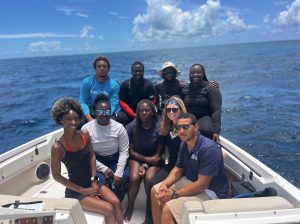
Become a PADI Dive Instructor in The Bahamas | Conservation-Focused IDC
Become a PADI Dive Instructor in The Bahamas | Conservation-Focused IDC | Perry Institute for Marine Science Education & Training Ready to take your diving skills to the next level
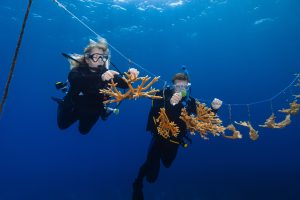
Stream2Sea Coral Care: The World’s First Reef-Positive Sunscreen
Stream2Sea Coral Care: The World’s First Reef-Positive Sunscreen | Perry Institute for Marine Science Conservation Partners Stream2Sea Coral Care: The World’s First Reef-Positive Sunscreen Discover why PIMS has partnered with

Build a Coral Reef for the Holidays | PIMS x Partanna
PIMS is partnering with Partanna to build a 100m² carbon-negative reef. Rick Fox is matching donations up to $25k. Help us build a sanctuary for the future.
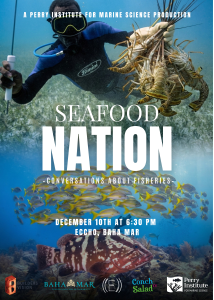
“Seafood Nation” Documentary Premiere Explores the Heart of Bahamian Culture and the Future of Fisheries
NASSAU, The Bahamas | December 5, 2025 – From the bustling stalls of Potter’s Cay to family kitchen tables across the archipelago, seafood is far more than just sustenance in
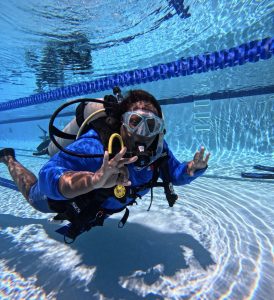
PIMS and Disney Conservation Fund Partner to Train 19 Government Divers
PIMS dive training in Nassau strengthened national coral restoration capacity across government agencies. Bahamas Dive Training Builds National Coral Restoration Capacity Last fall, between the months of September and October,
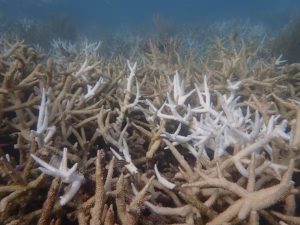
Florida’s Coral Reef Crossed a Line: What Functional Extinction Really Means for Elkhorn and Staghorn Corals
Reefs didn’t just bleach. They functionally vanished in one summer. A new Science study co-authored by researchers from the Perry Institute for Marine Science (PIMS) has found that Florida’s two


